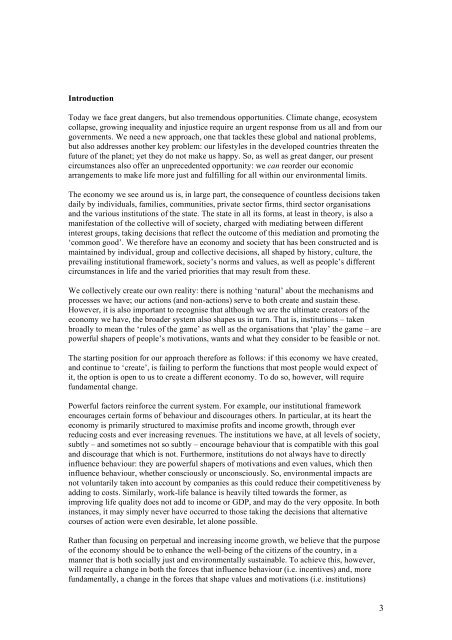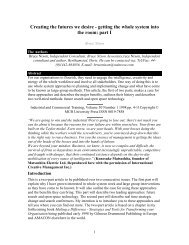From Old Economics to New Economics- Radical ... - Bruce Nixon
From Old Economics to New Economics- Radical ... - Bruce Nixon
From Old Economics to New Economics- Radical ... - Bruce Nixon
You also want an ePaper? Increase the reach of your titles
YUMPU automatically turns print PDFs into web optimized ePapers that Google loves.
Introduction<br />
Today we face great dangers, but also tremendous opportunities. Climate change, ecosystem<br />
collapse, growing inequality and injustice require an urgent response from us all and from our<br />
governments. We need a new approach, one that tackles these global and national problems,<br />
but also addresses another key problem: our lifestyles in the developed countries threaten the<br />
future of the planet; yet they do not make us happy. So, as well as great danger, our present<br />
circumstances also offer an unprecedented opportunity: we can reorder our economic<br />
arrangements <strong>to</strong> make life more just and fulfilling for all within our environmental limits.<br />
The economy we see around us is, in large part, the consequence of countless decisions taken<br />
daily by individuals, families, communities, private sec<strong>to</strong>r firms, third sec<strong>to</strong>r organisations<br />
and the various institutions of the state. The state in all its forms, at least in theory, is also a<br />
manifestation of the collective will of society, charged with mediating between different<br />
interest groups, taking decisions that reflect the outcome of this mediation and promoting the<br />
‘common good’. We therefore have an economy and society that has been constructed and is<br />
maintained by individual, group and collective decisions, all shaped by his<strong>to</strong>ry, culture, the<br />
prevailing institutional framework, society’s norms and values, as well as people’s different<br />
circumstances in life and the varied priorities that may result from these.<br />
We collectively create our own reality: there is nothing ‘natural’ about the mechanisms and<br />
processes we have; our actions (and non-actions) serve <strong>to</strong> both create and sustain these.<br />
However, it is also important <strong>to</strong> recognise that although we are the ultimate crea<strong>to</strong>rs of the<br />
economy we have, the broader system also shapes us in turn. That is, institutions – taken<br />
broadly <strong>to</strong> mean the ‘rules of the game’ as well as the organisations that ‘play’ the game – are<br />
powerful shapers of people’s motivations, wants and what they consider <strong>to</strong> be feasible or not.<br />
The starting position for our approach therefore as follows: if this economy we have created,<br />
and continue <strong>to</strong> ‘create’, is failing <strong>to</strong> perform the functions that most people would expect of<br />
it, the option is open <strong>to</strong> us <strong>to</strong> create a different economy. To do so, however, will require<br />
fundamental change.<br />
Powerful fac<strong>to</strong>rs reinforce the current system. For example, our institutional framework<br />
encourages certain forms of behaviour and discourages others. In particular, at its heart the<br />
economy is primarily structured <strong>to</strong> maximise profits and income growth, through ever<br />
reducing costs and ever increasing revenues. The institutions we have, at all levels of society,<br />
subtly – and sometimes not so subtly – encourage behaviour that is compatible with this goal<br />
and discourage that which is not. Furthermore, institutions do not always have <strong>to</strong> directly<br />
influence behaviour: they are powerful shapers of motivations and even values, which then<br />
influence behaviour, whether consciously or unconsciously. So, environmental impacts are<br />
not voluntarily taken in<strong>to</strong> account by companies as this could reduce their competitiveness by<br />
adding <strong>to</strong> costs. Similarly, work-life balance is heavily tilted <strong>to</strong>wards the former, as<br />
improving life quality does not add <strong>to</strong> income or GDP, and may do the very opposite. In both<br />
instances, it may simply never have occurred <strong>to</strong> those taking the decisions that alternative<br />
courses of action were even desirable, let alone possible.<br />
Rather than focusing on perpetual and increasing income growth, we believe that the purpose<br />
of the economy should be <strong>to</strong> enhance the well-being of the citizens of the country, in a<br />
manner that is both socially just and environmentally sustainable. To achieve this, however,<br />
will require a change in both the forces that influence behaviour (i.e. incentives) and, more<br />
fundamentally, a change in the forces that shape values and motivations (i.e. institutions)<br />
3



